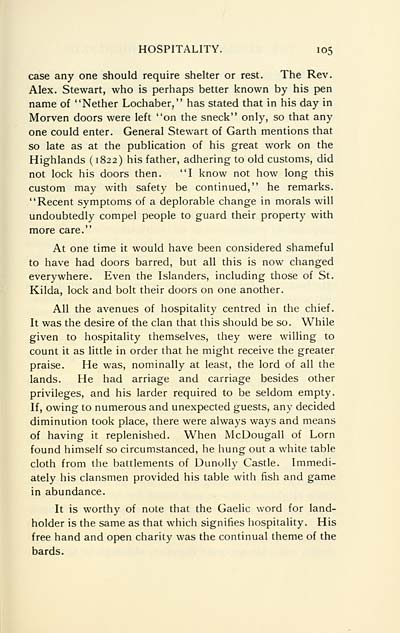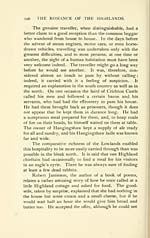Download files
Complete book:
Individual page:
Thumbnail gallery: Grid view | List view

HOSPITALITY. 105
case any one should require shelter or rest. The Rev.
Alex. Stewart, who is perhaps better known by his pen
name of "Nether Lochaber," has stated that in his day in
Morven doors were left "on the sneck" only, so that any
one could enter. General Stewart of Garth mentions that
so late as at the publication of his great work on the
Highlands (1822) his father, adhering to old customs, did
not lock his doors then. "I know not how long this
custom may with safety be continued," he remarks.
"Recent symptoms of a deplorable change in morals will
undoubtedly compel people to guard their property with
more care."
At one time it would have been considered shameful
to have had doors barred, but all this is now changed
everywhere. Even the Islanders, including those of St.
Kilda, lock and bolt their doors on one another.
All the avenues of hospitality centred in the chief.
It was the desire of the clan that this should be so. While
given to hospitality themselves, they were willing to
count it as little in order that he might receive the greater
praise. He was, nominally at least, the lord of all the
lands. He had arriage and carriage besides other
privileges, and his larder required to be seldom empty.
If, owing to numerous and unexpected guests, any decided
diminution took place, there were always ways and means
of having it replenished. When McDougall of Lorn
found himself so circumstanced, he hung out a white table
cloth from the battlements of DunoUy Castle. Immedi-
ately his clansmen provided his table with fish and game
in abundance.
It is worthy of note that the Gaelic word for land-
holder is the same as that which signifies hospitality. His
free hand and open charity was the continual theme of the
bards.
case any one should require shelter or rest. The Rev.
Alex. Stewart, who is perhaps better known by his pen
name of "Nether Lochaber," has stated that in his day in
Morven doors were left "on the sneck" only, so that any
one could enter. General Stewart of Garth mentions that
so late as at the publication of his great work on the
Highlands (1822) his father, adhering to old customs, did
not lock his doors then. "I know not how long this
custom may with safety be continued," he remarks.
"Recent symptoms of a deplorable change in morals will
undoubtedly compel people to guard their property with
more care."
At one time it would have been considered shameful
to have had doors barred, but all this is now changed
everywhere. Even the Islanders, including those of St.
Kilda, lock and bolt their doors on one another.
All the avenues of hospitality centred in the chief.
It was the desire of the clan that this should be so. While
given to hospitality themselves, they were willing to
count it as little in order that he might receive the greater
praise. He was, nominally at least, the lord of all the
lands. He had arriage and carriage besides other
privileges, and his larder required to be seldom empty.
If, owing to numerous and unexpected guests, any decided
diminution took place, there were always ways and means
of having it replenished. When McDougall of Lorn
found himself so circumstanced, he hung out a white table
cloth from the battlements of DunoUy Castle. Immedi-
ately his clansmen provided his table with fish and game
in abundance.
It is worthy of note that the Gaelic word for land-
holder is the same as that which signifies hospitality. His
free hand and open charity was the continual theme of the
bards.
Set display mode to: Large image | Transcription
Images and transcriptions on this page, including medium image downloads, may be used under the Creative Commons Attribution 4.0 International Licence unless otherwise stated. ![]()
| Early Gaelic Book Collections > Ossian Collection > Romance of the Highlands > (135) |
|---|
| Permanent URL | https://digital.nls.uk/81817245 |
|---|
| Description | Selected books from the Ossian Collection of 327 volumes, originally assembled by J. Norman Methven of Perth. Different editions and translations of James MacPherson's epic poem 'Ossian', some with a map of the 'Kingdom of Connor'. Also secondary material relating to Ossianic poetry and the Ossian controversy. |
|---|
| Description | Selected items from five 'Special and Named Printed Collections'. Includes books in Gaelic and other Celtic languages, works about the Gaels, their languages, literature, culture and history. |
|---|

